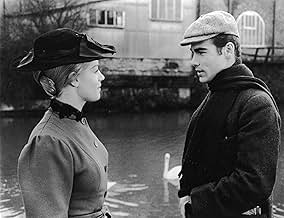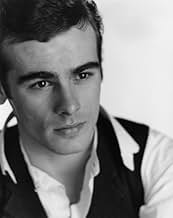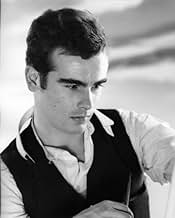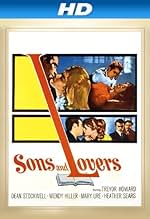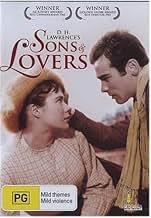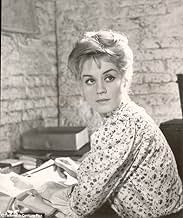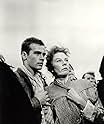Füge eine Handlung in deiner Sprache hinzuA young man with artistic talent lives in a close-knit coal-mining town and finds himself inhibited by his emotionally manipulative mother.A young man with artistic talent lives in a close-knit coal-mining town and finds himself inhibited by his emotionally manipulative mother.A young man with artistic talent lives in a close-knit coal-mining town and finds himself inhibited by his emotionally manipulative mother.
- Regie
- Drehbuch
- Hauptbesetzung
- 1 Oscar gewonnen
- 8 Gewinne & 16 Nominierungen insgesamt
Empfohlene Bewertungen
D. H. Lawrence is at an all time low in popularity--both his books and the movies based on them. Why? Good question. It's more than just passing tastes. I think it has to do with the precious boundary breaking that once made Lawrence a daring darling of the literary set. Sexual taboos have since been so radically eclipsed, from Henry Miller to John Updike, not to mention hundreds of less mainstream authors, Lawrence is almost stuffy and pretentious.
Or so it would seem. "Sons and Lovers" is a love story set in a tough mining town in England early in the 20th Century. It's filled with the longing of a man to rise out of these pits and be "something" in the world--namely, a successful painter. The girl who loves him is overly devoted, and after a tryst (that was the radical part) there is a falling apart of things. How true this can be! I mean, this is great stuff--a sensitive story about the feelings most of us have had, where desire is mistaken for something deeper, where the world is calling and love, or shades of love, are not enough to keep you home.
The filming is straight out of the gritty, short period of British films known rough as the British New Wave or the Angry Young Men (or both). These films, a grown out of French New Wave and early Italian neo-realism, were a reaction against the slick and vacuous big studio filmmaking (Hollywood especially) from this period. There are more typical films from this group than "Sons and Lovers" but it's certainly part of that mood, looking at working class life, filming with great economy and directness, and using actors in a realistic, vaguely documentary way. For insight into this kind of film, try "Loneliness of a Long Distance Runner" or "Look Back in Anger." Even the first Beatles film, oddly enough, is influenced by this movement ("A Hard Day's Night"), in the raw, fast, black and white style.
But if that's the context, you still have to ask if this film is any good. And the answer is quite. It's a big movie, a deep movie, emotional and deeply serious. It is sad, too, overall, or perhaps melancholy is a better word, and this gloom is slightly wearing after a bit. Some people will find that talking about love is a peculiarly British and indirect way of being in love--the literary overwhelms the truth.
Director Jack Cardiff is a cinematographer above all. This might explain the visual emphasis, the sublime, restrained photography. Lead young actor Dean Stockwell is a perfect visual cast, and he really is good, somehow, in a way that is convincing, though he isn't always commanding. A small part of me didn't care what happened to anyone in the movie. It was all plain to see, and I knew what I was supposed to feel, but I didn't always get the force of those feelings.
The movie, like the book, is patient and deliberate, and quite nuanced and beautiful.
It then seemed to vanish, at least for me, until, amazingly, the American Cinematheque in Los Angeles screened it on a Monday night some months ago. I was extremely impressed with it again, especially the BxW CinemaScope cinematography (and I agree, wide-screen is the way to see this rare film, if indeed you ever can).
So many thanks to the Cinematheque for this unusual revival.
RE the musical score (by Italian composer, Mario Nascimbene): actually the theme was so melodic Percy Faith recorded it as a follow-up to his hit single of Max Steiner's SUMMER PLACE theme, (complete with similar 1950s piano triplets in the accompaniment!) In spite of the nod to '50s pop the SONS AND LOVERS theme was not a hit, but it remains one of the more lyrical (and obscure) movie themes from this period.
Remember when movies actually had original musical themes????
Ultimately I feel SONS AND LOVERS ranks with Russell's WOMEN IN LOVE in the admittedly small canon of excellent cinematic Lawrence adaptations.
It's also one of the adult Dean Stockwell's best roles, a long, long day's journey away from the almost too adorable, curly headed moppet in ANCHORS AWEIGH.
Amazingly, this was a Hollywood production (made by 20th Century Fox) and, as such, leading man Dean Stockwell (who was probably never better) was imposed on Cardiff by producer Jerry Wald - though he seems to have been pleased with his performance. The acting of the Oscar-nominated Trevor Howard (as Stockwell's boorish and drunkard coal-miner father) and Mary Ure (as the married but separated young suffragette with whom Stockwell has an affair), as well as Wendy Hiller (as his strong but possessive mother), is irreproachable. The supporting cast includes Ernest Thesiger (in one of his last films) and Donald Pleasence, with both unfortunately having limited screen-time.
Freddie Francis' luminous black-and-white cinematography earned the film its only Oscar; interestingly, Francis also followed in Cardiff's footsteps and became a film director himself (with similarly erratic results, ironically enough). Mario Nascimbene's lovely music score and the film's vivid recreation of an era (in authentic locations, no less) add immeasurably to its lasting impression.
The coal-mine setting recalls earlier films like Carol Reed's THE STARS LOOK DOWN (1939) and John Ford's HOW GREEN WAS MY VALLEY (1941), with which it can be favorably compared. Still, for all its quaint Englishness and the inherent sentimentality of its narrative, the film is a remarkably adult and frank depiction of sexual and artistic awakening vis-à-vis repressed Edwardian society and, together with Ken Russell's equally celebrated adaptation of WOMEN IN LOVE (1969), remains undoubtedly the finest screen rendition of D. H. Lawrence's work.
It's a shame, therefore, that this is as yet unavailable on R1 DVD but the R2 edition I own is a more than adequate substitute, with a very nice-looking print of the main feature, surprisingly strong audio and, apart from the basic supplements of the original theatrical trailer and a stills gallery, features a wonderful interview with Cardiff about the making of SONS AND LOVERS (interspersed with relevant clips from the film itself) which clocks in at around half-an-hour.
The other star is that great actress Wendy Hiller. Her role is far from entirely sympathetic. She suffocates her favorite son, well played by Dean Stockwell. She is demanding in a quiet way and selfish in a manner passing itself off as martyrdom. But what a gorgeous performance! Mary Ure was a fine actress. Somehow, though, the character she plays doesn't entirely work in my view. It seems more from kitchen-sink realism, like the Shelagh Delaney plays that were filmed around this time. (And where have they gone? Why don't we ever see "A Taste of Honey" or "The Leather Boys" anymore?) Heather Sears is good but I have to admit, to my embarrassment, I found it hard to shake her excellent performance in the tile role of "The Story of Esther Costello" from my mind. Her being a bright young woman taken with Stockwell, therefore, startled me throughout. That is my own failing and surely not hers.
This is a superb movie. All of it is good. But for me, the scenes involving Hiller are the most compelling. Howard, too, is superb. And Stockwell as Paul. The family story is heart-wrenching.
Wusstest du schon
- WissenswertesDean Stockwell was cast at producer Jerry Wald's insistence to help the film's chances of distribution in the United States.
- Zitate
Miriam: You know, my mother disapproves more and more of the books you bring. She blames you for putting ideas into my head.
Paul Morel: Does she think heaven frowns on ideas? Your mother breathes religion through her nostrils!
Miriam: Do you think that's wrong?
Paul Morel: It's not religious just to be religious! I think a crow is religious as it sails across the sky. It's showing the glory of God but it doesn't know it. God doesn't know things, he is things.
- VerbindungenFeatured in Cameraman: The Life and Work of Jack Cardiff (2010)
Top-Auswahl
Details
Box Office
- Budget
- 500.000 $ (geschätzt)
- Laufzeit1 Stunde 43 Minuten
- Farbe
- Seitenverhältnis
- 2.35 : 1
Zu dieser Seite beitragen



